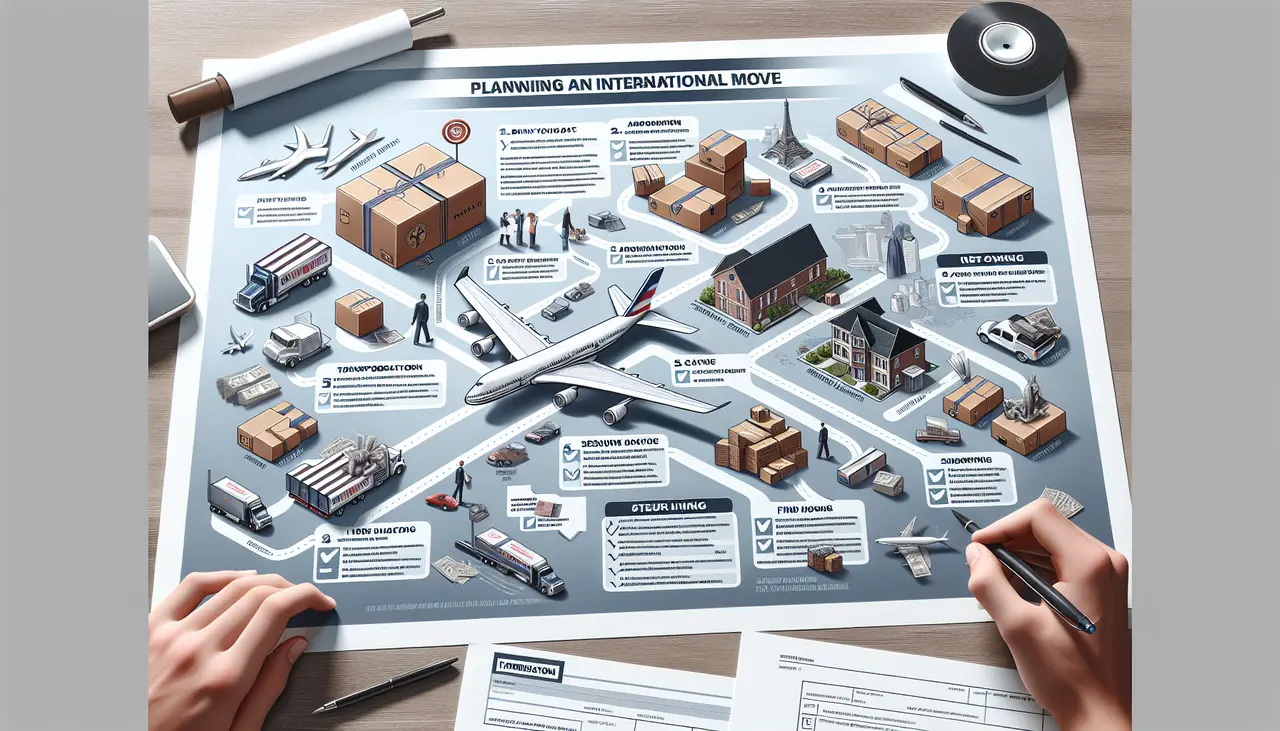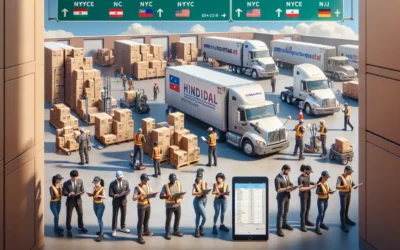Introduction to Planning an International Move from NYC and NJ
Starting an international move from New York City or New Jersey feels like gearing up for a major expedition. You’re not just moving your stuff; you’re shifting your life across borders. The key here is not to dive in blindly. Knowing what you’re up against can save you from headaches later on. So, consider this your blueprint. Moving countries is a big deal. You’re dealing with customs, possibly a new language, and a whole lot of paperwork. It’s not just about packing boxes. It’s about planning, preparing, and then packing. Whether you’re moving for work, family, or just a change of scenery, understanding the process is your first step. Trust me, it’s a journey worth taking, but only with the right map in hand.
Understanding the Role of International Movers in Your Relocation
When you’re moving internationally from New York City or New Jersey, choosing the right international movers is crucial. Think of them as your journey’s pilots. They don’t just move your boxes; they navigate the complex logistics of getting your life from here to there. International movers take care of the heavy lifting, sure. But their role goes way beyond that. They’re experts in managing customs paperwork and understanding import regulations, which can be a maze if you’re not familiar. They make sure your belongings aren’t just moved, but moved legally and safely across borders. Plus, they offer advice on packing to ensure your items meet international shipping standards and arrive in one piece. Choosing a seasoned mover can mean the difference between a smooth transition and a logistical nightmare. So, when you’re compiling your moving to-do list, put “select a reliable international mover” right at the top. They’re your front-line allies in turning the chaos of moving across the globe into a structured journey to your new home.
Pre-move: Creating a 6-month Timeline for a Stress-Free Move
Six months might seem like a long time, but when it comes to moving internationally, it’s just right to ensure a stress-free transition. Start with the big picture and then zoom in on the details. Month 1: Research and Decision Making. Dive into the specifics of your destination. Understand the cost of living, and get to know the culture and language if it’s different. Decide on your moving date and start looking for international moving companies. Month 2: Paperwork. This is crucial. Begin gathering personal documents—passports, visas, medical records. If you’re moving for work, get your employment documents in order. Month 3: Sorting Out Belongings. Go through your stuff. Decide what to take, what to sell, and what to donate. It’s a good time to start packing non-essential items too. Month 4: Finalize Plans with Movers. By now, you should have chosen a moving company. Confirm dates, costs, and the services they’ll provide. Month 5: Address Changes and Utilities. Notify necessary parties of your move—banks, subscriptions, and set up or cancel utilities. Month 6: The Last Checks. Double-check everything. Make sure your documents are in order, re-confirm plans with the movers, and pack your essentials. This timeline isn’t set in stone, but it gives you a clear path to follow. The key to a stress-free move is starting early and tackling tasks bit by bit.
3-4 Months Before Moving: Documents and Visas Preparation
At this stage, you got about 3 to 4 months before the big move. First things first, get your paperwork in order. No kidding around, handling this early saves you a ton of stress later. You’ll need a valid passport. Check if yours is still good. If not, renew it pronto. Also, sort out your visa. Depending on where you’re moving, the visa process can be a real pain, so start this ASAP.
Here’s what to do: Figure out the type of visa you need. Work? Student? Something else? Then, dive into the application process. It’s different for every country, but expect to fill out forms, possibly attend an interview, and definitely prove that you’re not planning to be a burden to your new home country.
Don’t forget about other essential documents. Birth certificates, marriage certificates if applicable, and definitely any adoption or custody papers for children making the move with you. And, if you’re taking a pet, look into their paperwork too.
Long story short? Documents and visas aren’t the most thrilling part of moving, but they’re crucial. Get these sorted, and you’re on your way to a smoother move.
2 Months Pre-move: Sorting, Selling, and Donating Items
Two months out, it’s crunch time for sorting through your stuff. Think of it as a massive declutter session. You’ve got things you love, things you need, and then there’s everything else. Everything else? Time to decide what goes and what stays. Start by making piles. A pile to keep, one to sell, and one to donate. Selling can pad your moving budget. Apps like OfferUp and Facebook Marketplace are your friends here. Easy to use, and you reach lots of people fast. For donations, think about charities that pick up items. Saves you a trip, and you help someone in need. Clothes, books, unused kitchen gadgets? Perfect donation material. Remember, the goal is to lighten your load. Moving internationally isn’t cheap, and the more you take, the more it costs. Plus, starting fresh in a new place feels good. Keep it simple, and you’ll thank yourself later.
1 Month to Go: Finalizing Accommodations and Travel Arrangements
With one month left, it’s crunch time. You’ve got to nail down where you’re going to crash and figure out how you’re getting there. First off, if you haven’t sorted your new home or temporary place to stay, do it now. Use online listings or get in touch with a local real estate agent in your destination country. Make sure it fits your budget and it’s in a safe neighborhood. Next, book your flights. Prices might be high this close to your departure, but you still might snag a deal if you’re flexible with your dates. Don’t forget about any pets or cars. Look into pet relocation services and decide if shipping your car is worth it or if selling it is a better option. Last, confirm all your travel arrangements a week before you leave. Double-check flight times, accommodation bookings, and transport plans. It’s all about eliminating surprises. Getting this stuff out of the way will let you focus on the big move without last-minute panic.
2-3 Weeks Before Moving: Contact International Movers for Final Details
Now, we’re down to crunch time. 2-3 weeks out, it’s critical to nail down final details with your movers. Reach out to your chosen international movers to confirm all the details. Make sure dates, times, and logistics are set in stone. This is also the perfect time to verify the volume of goods you’re shipping and ensure you’re on the same page about costs. Misunderstandings now can lead to big headaches later. Also, discuss insurance options for your belongings during transit. You’ve invested a lot in what you’re moving; making sure it’s protected is a no-brainer. Double-check documentation requirements too. Some countries have unique rules about what needs to accompany your shipment. Avoid surprises by getting this clear now. Keeping these lines of communication open with your movers is key to a smooth transition.
The Final Week: Packing Tips and Checklist from Expert International Movers
In the final week before your big move, time is tight, and stress levels can spike. Here’s your no-nonsense checklist and packing tips straight from expert international movers. First off, tackle the essentials. Documents, valuables, and daily necessities need to be within easy reach. That means passports, moving paperwork, medications, chargers, and a couple of changes of clothes. Keep these in your carry-on or personal bag.
Next, let’s talk boxes. By now, your life should be in them. Here’s how to seal the deal:
- Label everything. Be clear and specific. “Kitchen” is okay; “Utensils – Forks & Knives” is better.
- Heavy items in small boxes. Your back will thank you. Books are a prime example.
- Wrap it up. Fragile items need a little extra TLC. Bubble wrap or even clothes can cushion the journey.
- Vacuum bags for clothes. Save space and keep clothes relatively wrinkle-free.
- Essential box. The first box you’ll open at your new home. Include some plates, cups, and basic tools.
In this whirlwind time, keep a cool head. Cross off these tasks, and you’re setting yourself – and your possessions – up for a smoother transition. Remember, international moves are a marathon, not a sprint. This final week? It’s about smart, strategic packing. Safe travels!
Moving Day: What to Expect from Your International Movers
On moving day, expect your international movers to show up on time, ready to pack and load your belongings with care. They’ll have a checklist to ensure nothing is missed. Your Job? Ensure everything is ready to go. That means all your boxes are packed unless you’ve paid for packing services. Be clear about items needing special handling. The movers will handle the heavy lifting, expertly navigating furniture through tight spaces. They’ll inventory your items, making sure each box and piece of furniture is accounted for before it hits the road, or in this case, the sea or air. Before they leave, they’ll confirm the delivery timeline and go over the paperwork one last time. Remember, communication is key. If you have questions or last-minute changes, speak up. Your movers are there to make this transition as smooth as possible.
Settling In: Post-Move Checklist for Successfully Adjusting to Your New Country
Once you’ve arrived in your new country, it’s time to settle in and get comfortable. This phase is all about adjusting and making your new place feel like home. Here’s a straightforward post-move checklist to ease into your new life:
Register with local authorities. It’s probably the first thing you gotta do. Depending on where you’ve moved, you might need to register for residency or with the local town hall.
Open a local bank account. You’ll need it for just about everything financial – from receiving your salary to paying rent.
Get a local SIM card or phone plan. Staying connected is crucial, not just for apps and internet but also for calls in case of anything urgent.
Learn the public transportation system. Grab maps, download apps, and you’ll start feeling like a local, moving around without getting lost.
Find a good healthcare provider. Before you actually need it, know where to go and how the healthcare system works in your new environment.
Explore local grocery stores and markets. Food is a big part of settling in. Find where you can get your daily needs and maybe some comfort food from back home.
Take language classes if needed. Not just for getting by, but learning the local language will help you feel a part of the community.
Start networking. Look for expat groups, clubs, or classes where you might meet new friends and get insights about living in your new country.
Remember, it’s normal to feel a bit lost or overwhelmed at first. Take it one step at a time. You’ve got this!




